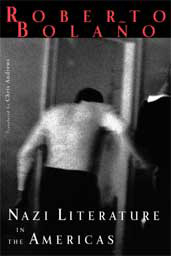
Excerpts From Nazi Literature In The Americas. Roberto Bolano. Translated by Chris Andrews. New Directions Books 2008 (1996).
88. (6). Meanwhile Edelmira and her children were presented to Adolph Hitler, who held Luz and said, "She certainly is a wonderful little girl." Photos were taken. The future Fuhrer of the Reich made a great impression on the Argentinean poet. Before leaving, she presented him with several of her own books and a deluxe edition of Martin Fierro. Hitler thanked her warmly, beseeching her to translate one of her poems into German on the spot, a task which, with the help of Carozzone, she managed to accomplish. Hitler was clearly delighted. The lines were resounding and looked to the future. In high spirits, Edelmira asked for the Fuhrer's advice: which would be the most appropriate school for her sons? He recommended a Swiss boarding school, but added that the best school was life itself. By the end of the audience, Edelmira and Carozzone were committed Hitlerites.
88. (16). This suicide, which seems at first an open and shut case, is investigated by a Scotland Yard detective with a passion for spiritualism, and by one of the dead man's sons. The investigation takes more than fifteen years and serves as a pretext for introducing a gallery of characters, including a young French neo-royalist and a young German Nazi, who are allowed to discourse at length and seem to serve as the author's mouthpieces.
88. (19). Throughout her life she treasured the famous photo of her baby self in Hitler's arms.
88. (46). Shortly before his death, in a letter to a friend in Buenos Aires, he foresaw a radiant epoch for the human race, the triumphant dawn of the new golden age, and he wondered whether the Argentinean people would rise to the occasion.
88. (47). As a young man Salvatico advocated, among other things, the re-establishment of the Inquisition; corporal punishment in public; a permanent war against the Chileans, the Paraguayans, or the Bolivians as a kind of gymnastics for the nation; polygamy; the extermination of the Indians to prevent further contamination of the Argentinean race; curtailing the rights of any citizen with Jewish blood; a massive influx of migrants from the Scandinavian countries in order to effect a progressive lightening of the national skin color, darkened by years of promiscuity with the indigenous population; life-long writer's grants; the abolition of tax on artists' incomes; the creation of the largest air force in South America; the colonization of Antarctica; and the building of new cities in Patagonia.
He was a soccer player and a Futurist.
88. (55-56). The first letters of each chapter made the acrostic LONG LIVE HITLER. A major scandal broke out. Perez Mason defended himself haughtily: it was a simple coincidence. The censors set to work in earnest, and made a fresh discovery: the first letters of each chapter's second paragraph made up another acrostic--THIS PLACE SUCKS.
88. (58). Perez Mason answered them by publishing a curious novella under the pseudonym Abelard of Rotterdam: an erotic and fiercely anti-USA fantasy, whose protagonists were General Eisenhower and General Patton.
88. (76). Barreda cheated on her with common chorus girls. He had no time for niceties and beat her almost every day. He used to put her down in public, and held her family in contempt, referring to them, in conversations with friends and strangers, as "a bunch of Cristero assholes . . . good for nothing except target practice."
88. (86). . . . and, that she had a black swastika tattooed on her left buttock.
88. (89). He published two books of poetry. The first, Motorists (1965), was a series of twenty-five sonnets, rather unorthodox in their rhythm and form, dealing with subjects dear to the young: motorcycles, doomed love, sexual awakening and the will to purity.
88. (93). Eye-witnesses of dubious reliability have sworn that in the main courtyard, instead of the Chilean colors, a red flag is flown, with a white circle in which a black swastika is inscribed.
88. (94). He had what it takes to fail spectacularly: even his earliest works have a discernible style of their own, an aesthetic direction that he would follow with hardly a deviation until the day he died. Schurholz was an experimental poet.
88. (95-96). The book is called Geometry, and it sets out countless variations on the theme of a barbed-wire fence crossing an almost empty space, sparsely scattered with apparently unrelated verses. The fences seen from the air trace precise and delicate lines. The verses speak--or whisper--of an abstract pain, the sun and headaches.